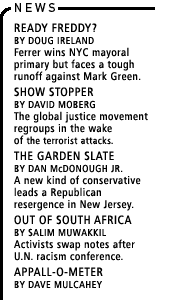|
|

|

|

|
|
|
| |
|
|
|
Do you get it now?" asked New York Times reporter Clyde Haberman on the day after the terrorist attacks in New York and Washington, suggesting that Americans ought now to understand Israel's violence against Palestinians. The next day, Times columnist Thomas Friedman wrote from Jerusalem that since they "hate our existence, not just our policies" we have "to fight the terrorists as if there were no rules." The terrorists are "world-class evil," Friedman explained, reinforcing the dangerous, Manichean framework that President Bush introduced immediately after returning from his hiding place in Nebraska. Israeli Prime Minister Ariel Sharon did not waste a minute. Realizing that international attention would be focused on the horrific attacks, he gave the Israeli military the green light to invade Jenin, Jericho and Ramallah. Accompanied by infantry, tanks rolled into the cities, while Apache helicopters flew overhead; within three days, 19 Palestinians were killed—including two children—and scores were injured. These recent Israeli actions—not unlike the assassinations, economic strangulation and the occupation itself—are condoned because they are perpetrated against terrorism. The end, according to the twisted logic advanced by both the Israeli government and eminent Times writers, justifies the employment of brutal violence. In their view, terrorism is not determined by the nature of the act, but rather by the actor's identity. Israel's assassinations and bombings are, apropos this distorted logic, radically different from the actions carried out by Palestinian militia. The Times articles not only condone Israeli crimes against Palestinians, they replicate the military discourse that has managed to colonize the mainstream media in the United States since the devastating attacks. This discourse, which reflects and reinforces the new modus operandi of the Bush administration, is all too familiar to most Israelis. The fact that Sharon's actions have undermined democracy and produced more bloodshed has not deterred the United States from following the Israeli lead. Even before the bodies have been counted and the dead buried, undemocratic practices have begun to manifest themselves in America. The decision to allow the detention of suspects for an indefinite period, alongside the move toward lifting restrictions imposed on the FBI and CIA, exemplifies how the emphasis on military solutions is already paving the way for an assault on civil liberties. But civil liberties are not the only rights at stake; economic and social rights are also in danger of being undermined as powerful corporations manipulate the situation to advance their avaricious objectives. Who will benefit from the $40 billion anti-terrorism and recovery package—to be taken from the "sacrosanct" Social Security surplus—which lawmakers approved, without blinking, three days following the attack? This sum is, of course, in addition to the some $325 billion that the bloated military apparatus already gobbles up each year. Not unlike the Israeli government—which recently passed its 2002 budget, slashing all social spending while dramatically increasing the money allocated to infrastructure and military—the U.S. Congress is now expected to circumscribe spending on health care, education and other social services, so as to confer billions on the military or, more precisely, on corporations like Lockheed Martin and Raytheon. In a week in which the Dow Jones posted a 14.3 percent loss, its largest since the Depression, Lockheed Martin and Raytheon gained 10 percent and 37 percent, respectively. The military discourse, however, is not only used to corral financial and political backing for the privileged few; it is also employed as a concealing mechanism. It is not coincidental that most commentators and political analysts discuss terrorism as if it were caused by an internal disposition that compels the actor toward violence. The widespread reiteration of the term "pure evil" is just one striking example. This view represses the fact that terrorism is generated by social wrongs, historical grievances and structural exploitation. To paraphrase Simone de Beauvoir, people are not born but become terrorists. Once a structural critique is adopted, it becomes clear that terrorism, and more importantly the grassroots support it needs to thrive, frequently arises from social injustices. The powers that be do not appreciate this kind of critique, for it suggests not only that the military cannot deal a death blow to terrorism, but that they are implicated in its creation. Accordingly, they treat terrorism's symptoms as if they were the root causes, while the actual causes are conveniently ignored. This is surely apparent in the Israeli case, whereby the government reacts to Palestinian resistance as if the occupation did not exist. The United States is also culpable. It has carried out, financed and supported terrorist acts in the past; it has upheld neoliberal economic policies with devastating effects on billions of people around the globe; and it has undermined the establishment of international institutions that would hear grievances and potentially offer nonviolent alternatives. The United States has also weakened the United Nations by its periodic unilateralism. Not unlike Sharon, Bush has decided to wreak more havoc by crying
war. He could have adopted a long-term vision, offering suggestions
on ways to curb and perhaps even eliminate the social forces that
engender terrorism. But that seems too much to ask from this administration.
|




